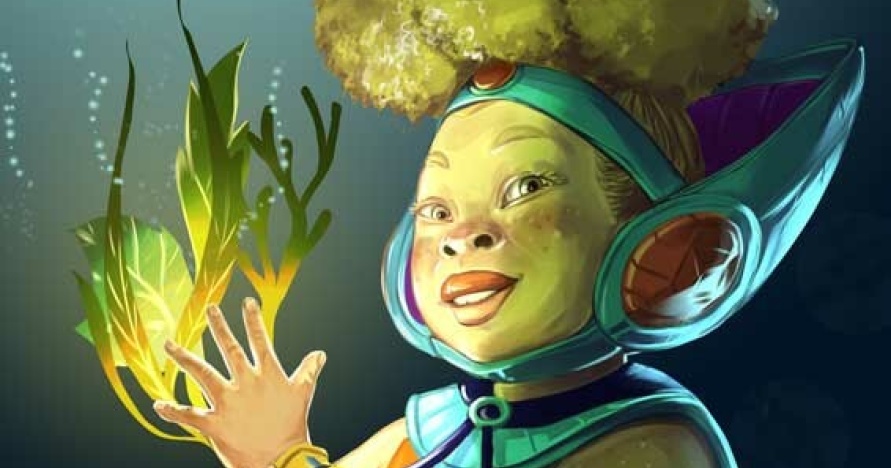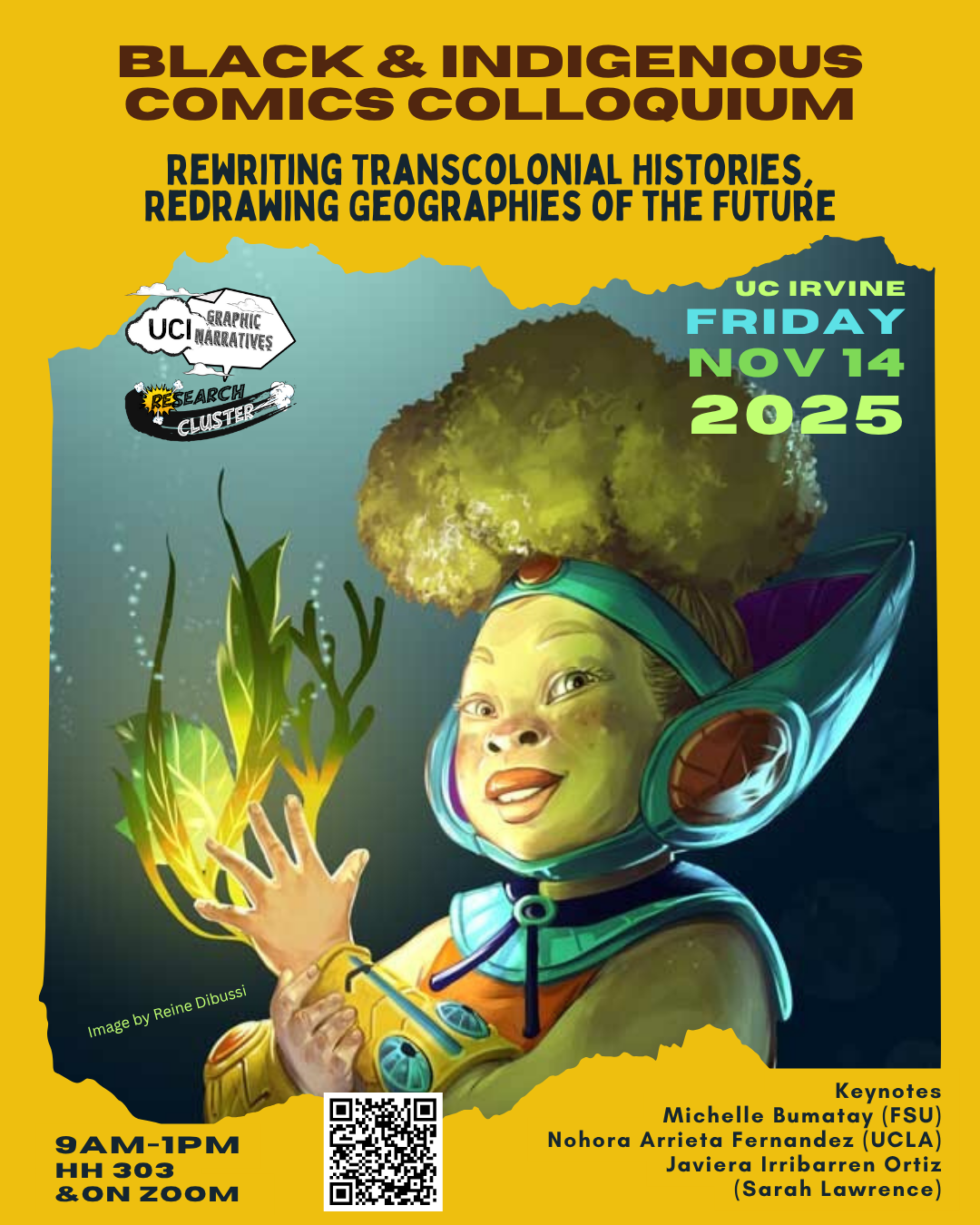
Black and Indigenous Comics Colloquium: Rewriting Transcolonial Histories, Redrawing Geographies of the Future. Please join us to enjoy three keynotes and a roundtable with three rising stars in the field of Global South comics studies. Breakfast will be provided.
Friday, November 14th
9am-12pm at Humanities Hall 303 or on Zoom.

Event sponsored by the Graphic Narratives Research Cluster, the Department of Spanish and Portuguese and the Center for Latin American and Caribbean Studies at UCI.
Michelle Bumatay is an Assistant Professor of French & Francophone Studies at Florida State University where she directs the Global Africas project. Her research centers on literature, comics, film, and visual culture from francophone Africa and the African Diaspora. She is the author of On Black Bandes Dessinées and Transcolonial Power (The Ohio State University Press) that explores the diversity of Black francophone cartoonists’ artistic, narrative, and material practices and illustrates the reparative dimensions of their work. She has contributed to numerous anthologies on global and francophone comics and has articles in several peer-reviewed journals. Additionally, she is currently on the editorial boards of European Comic Art, Imainaires, Comicalités, and Nouvelles études francophones.
Nohora Arrieta Fernández is a writer, researcher, and scholar. She is an Assistant Professor on Afro Latin American studies at UCLA. Her current research focuses on the aesthetics and intellectual traditions of the African Diaspora in the Americas. She has published essays and articles on Latin American literature and visual arts, comics, and the Afro-Latin American Diaspora, and has collaborated with art magazines Contemporyand, Artishock, and Terremoto. Her scholarly publications have appeared in Transition, Latin American and Latinx Visual Culture, in the United States, and in multiple journals in Brazil and Colombia. Her first co-translation project, Semantic of the World: the Poetry of Romulo Bustos Aguirre, was published by University of New Mexico Press in 2022. Her research has been supported by Fulbright, the Brazilian Studies Association, The American Council for Learned Societies, and The Andrew W. Mellon Foundation. She was the editor in chief of BLUE/AZUL, a reader on visual arts in the African Diaspora, and is co-founder of the art criticism collective Dual.
Javiera Irribarren Ortiz holds a PhD in Latin American and Iberian Cultures from Columbia University. She is currently a Guest Faculty member in the Department of Language and Literature at Sarah Lawrence College. Drawing from her doctoral research, she is developing a book proposal on contemporary comics from Brazil and Chile that imagine alternative futurities through racial and ethnic representation. Her work focuses on contemporary Latin American culture, with an emphasis on comics, film, and transmedia storytelling. Her research and teaching interests include Spanish-language pedagogy, visual culture, critical race theory, and environmental humanities. Javiera is the co-founder of the “Red Investigadora en Narrativa Gráfica” (RING-Latam) and has published peer-reviewed articles on Latin American science fiction and material culture.
Keynotes and Roundtable Schedule
9 am Javiera Irribarren Ortiz’s keynote
10 am Michelle Bumatay’s keynote
11am Nohora Arrieta Fernández’s keynote
12pm Roundtable
Image credit: Reine Dibussi, queend.over-blog.com, 5 November 2016.
Contact: Rocío Pichon-Rivière pichonrm@uci.edu
Details about the Keynotes
“Seeing the unseen: Marcelo D Salete's invisible Poetics” by Nohora Arrieta Fernández
In 2014, Brazilian cartoonist Marcelo D'Salete won the prestigious Eisner Prize for his book Run for It, which tells stories of enslaved people on colonial Brazilian plantations. He is also well known for Angola Janga (2017), an epic comic about the Quilombo dos Palmares. In this presentation, I delve into D'Salete's comics and aesthetics to explore how he develops a poetics deeply rooted in Caribbean and Brazilian Black traditions of fugue and maroonage.
“Picturing Inclusive Afrotopias: Visual Afrofuturist Ecolinguistics” by Michelle Bumatay
This paper builds on the work of Felwine Sarr (Afrotopia, 2016, Report on the Restitution of African Cultural Heritage, 2018) and Achille Mbembe (To Write the Africa World, 2017) to reflect on comics by artists from francophone Africa and their active reconfiguration of colonially-imposed forms of knowledge. More precisely, adapting Isaac Joslin’s notion of Afrofuturist Ecolinguistics developed to analyze francophone African literature, this paper considers Objectif terre! by Congolese artist Barly Bartui published in 1994 alongside more recent comics published by L’Association Afiri Studio, a collaborative and decidedly decolonial enterprise started in 2020 by Cameroonian artists Reine Dibussi and Carine Bahanag. In all of the comics studied, local knowledge as well as local knowledge production are the means of imagining and engendering inclusive alternatives to colonial ways of being in the world.
“Indigenous Futurities, Ethnic Worlds: Superhero Comics and Ideology in Chile and Brazil” by Javiera Irribarren Ortiz
Building on the Latin American comics boom of the 2000s, I analyze independent and state-funded projects that blend folklore, fiction, and superhero genres to challenge colonial and racial imaginaries. From the Indigenism paradigm in Chile to the Regionalism framework in Brazil, these contexts are shaped by historical and cultural dynamics rooted in Westernization and globalization. The evolution of the medium in both cases has been influenced by dictatorship-era censorship, the neoliberal production logics established between the 1980s and 1990s, and the rise of counter-narratives that redefine national identity. Through a comparative approach, I examine relational perspectives on identity that move beyond colorism and are instead guided by ideological affinities. While in Chile superhero comics often romanticize Indigenous and mestizo cultures from a perspective associated with the progressive left, the Brazilian case reveals a more heterogeneous field that ranges from progressive initiatives to nationalist, conservative movements.
In Chile, Indigenous superheroes reappropriate mainstream codes to dismantle stereotypes rooted in eugenic, Western discourses of otherness, and homogenizing visions of the nation. The Guardianes del Sur saga (2017–2021) reimagines historical Mapuche figures as superheroes, emphasizing their agency in resisting Spanish colonialism. Similarly, Mecha Selk’nam: Sorren (2020; 2022) adopts the aesthetics of the Japanese mecha genre to envision alternative futurities in which the Selk’nam rebuild an ultra-technological society after genocide and colonization. In Brazil, I analyze Universo Guará (2020–present), an independent publishing project that adapts the transmedia logic of Marvel and DC to Brazilian contexts. Its transformation from Guará Entretenimento (2018–2019), associated with the so-called “right-wing comics”, to Universo Guará reflects a shift toward arcs and settings grounded in regional diversity. The evolution of its superheroes and vigilantes also signals a turning point in what I call a contemporary comic book war, where heterogeneous ideologies compete to define the nation.
